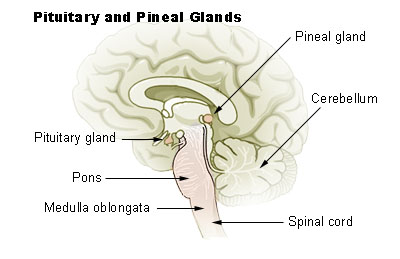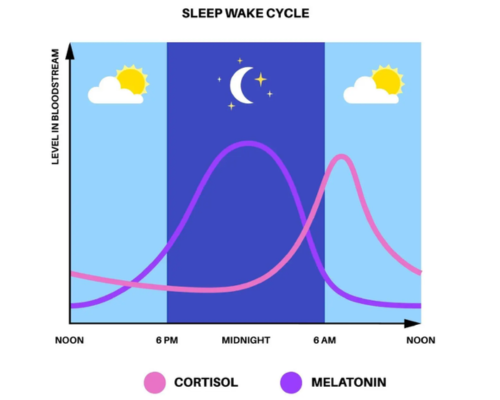Is Taking Melatonin Useful for Frequent Sleeplessness?
In recent years, melatonin has been a subject of ongoing debate. While people with sleep disorders often praise its benefits, some long-term users express deep concerns about its side effects and potential toxicity. So, is melatonin essentially good or bad?
How Does Melatonin Help You Sleep?
It’s essential first to understand how it functions in the human body.
Melatonin, often referred to as the “sleep hormone,” is primarily secreted by the pineal gland in the brain. Its production is regulated by light exposure. When night falls and ambient light dims, the retina signals the brain, prompting the pineal gland to increase melatonin secretion. Think of this substance as the body’s natural “sleep switch”—it tells your brain and body, “It’s dark, time to prepare for sleep.”
The pineal gland secretes melatonin
More specifically, melatonin helps shorten the time it takes to fall asleep and reduces nighttime awakenings, thereby improving overall sleep quality.
Melatonin secretion is influenced by two key factors:
Circadian Rhythm: Generally, melatonin levels decrease during the day and gradually rise at night. The secretion level at night directly affects sleep quality. Disruption of the circadian rhythm can lead to abnormal melatonin production.
Age: As people age, melatonin secretion declines. In the elderly, melatonin levels may drop to just one-tenth of their peak, making them more prone to sleep disorders.
Circadian rhythm: Melatonin and cortisol cycles, Image source: Life’s Chemistry Press
Melatonin Only Treats Two Types of Insomnia
One type is age-related primary insomnia. With aging, the natural decline in melatonin production makes older adults more susceptible to sleep issues. For this type of insomnia, melatonin supplementation is generally effective—particularly for patients over 55, with treatment durations of 6–12 months showing notable improvements in sleep quality and good safety profiles.
The other type is sleep disorders caused by circadian rhythm disruptions, commonly seen in shift workers or travelers with jet lag. These result from inverted sleep-wake cycles disturbing natural melatonin secretion. In such cases, appropriate melatonin use can help realign the melatonin rhythm with the sleep cycle and enhance sleep quality.
However, melatonin is not effective for secondary insomnia caused by underlying health conditions, psychological issues, or emotional fluctuations. Since these are unrelated to reduced melatonin secretion, supplementing with melatonin won’t help.
Is Melatonin Safe?
In medical practice, melatonin is recognized for several advantages: it’s endogenous, effective at low doses, low in toxicity, and non-habit-forming.
Many studies indicate that short-term, low-dose melatonin has minimal impact on the body. Especially when compared to some prescription sleep aids, it shows no significant side effects. As a result, melatonin is not strictly regulated in the United States.
That said, there’s no consistent conclusion regarding the long-term safety of melatonin. Some studies suggest that long-term overuse may interfere with the body’s natural melatonin production. Excessive intake can also lead to drowsiness and reduced mental alertness.
How Should Melatonin Be Taken?
Since melatonin clears from the body relatively quickly, it’s best taken 1–2 hours before bedtime.
For most adults simply looking to improve sleep, starting with a low dose of 0.5 mg to 1 mg is the wisest and safest approach. If ineffective, the dose can be gradually increased, though it’s generally not recommended to exceed 5–10 mg.
| Situation | Recommended Starting Dose | Advice |
| General adult difficulty falling asleep | 0.5 mg – 1 mg | Start with the lowest dose, 30–60 minutes before bed |
| Jet lag | 0.5 mg – 3 mg | Take according to destination bedtime |
| Use in children | Must follow doctor’s orders | Do not administer to children without medical guidance |
It’s especially important to note that melatonin isn’t suitable for everyone. The following groups should avoid it:
① Pregnant or breastfeeding women
② Individuals with depression or psychiatric conditions
③ Those operating vehicles or machinery
④ Adolescents and individuals with autoimmune diseases
Additionally, melatonin can interact with various medications, potentially reducing their efficacy. It should not be taken together with drugs such as aspirin, ibuprofen, or indomethacin.
Stanford Chemicals Company (SCC) supplies 99% pure melatonin powder, along with a wide range of other food and nutraceutical raw materials such as Chondroitin Sulfate, Vitamin K3, Dihydromyricetin, Magnolol…


